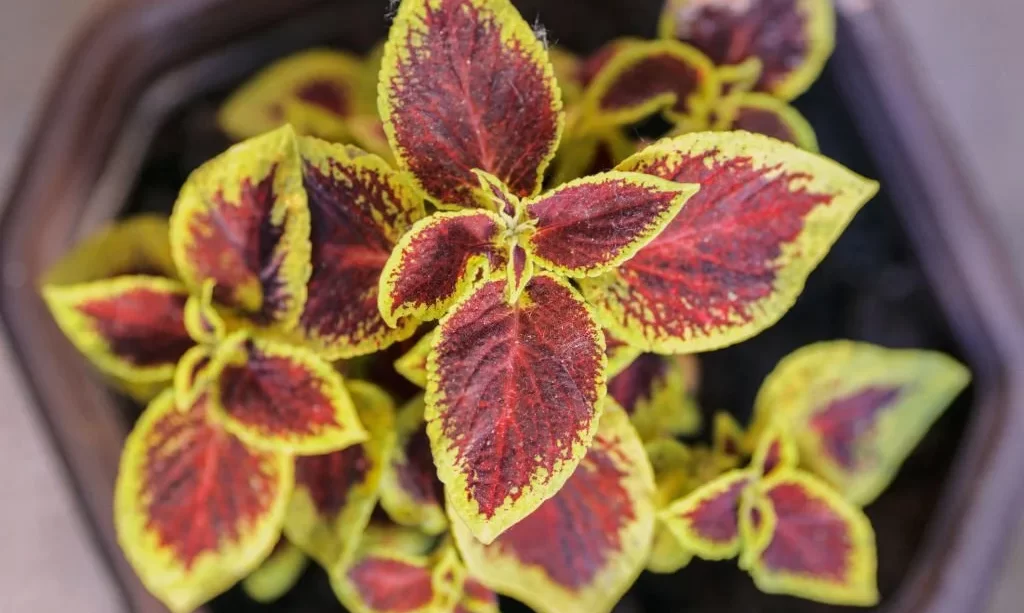Coleus plants are a common sight in gardens and households, known for their strikingly colorful foliage and vibrant presence. These ornamental plants come in a variety of shapes and sizes, making them a favorite among garden enthusiasts and indoor plant lovers. While their lush leaves add beauty to our surroundings, pet owners need to be aware of potential hazards. In this article, we will explore whether Coleus plants pose a threat to our four-legged friends. Is the beauty of Coleus leaves accompanied by hidden dangers for our beloved dogs? Let’s delve into this important topic to ensure the safety of our furry companions.
Coleus Plants
To appreciate the potential danger of Coleus plants to dogs, it’s essential to understand these ornamental beauties:
- Vibrant Foliage: Coleus plants (genus Plectranthus scutellarioides) are characterized by their lush and multicolored leaves. The foliage can range from deep greens to striking reds, purples, and yellows, often featuring intricate patterns and vibrant contrasts.
- Versatility: Coleus plants are versatile and can thrive both indoors as houseplants and outdoors in gardens. Their adaptability to various growing conditions makes them a popular choice among gardeners.
- Common Varieties: Some common Coleus varieties include “Wizard,” “Rainbow,” and “Kong,” each displaying its unique leaf coloration and pattern. These varieties are prized for their aesthetic appeal.
Are Coleus Plants Toxic to Dogs?
The safety of our furry companions is a top concern, and that includes knowing if Coleus plants pose a threat to dogs:
- Toxic Components: Coleus plants contain toxic compounds known as diterpenoids, which can be harmful to dogs when ingested. These compounds can cause various adverse reactions in dogs.
- Ingestion Risks: Dogs are naturally curious and may chew on plants or leaves within their reach. If a dog consumes parts of a Coleus plant, it can lead to symptoms of poisoning.
- Potential for Toxicity: While not all dogs will react the same way to Coleus ingestion, it’s essential for pet owners to be aware of the potential risk and take preventive measures to keep their pets safe. Symptoms of toxicity can range from mild gastrointestinal upset to more severe reactions, depending on the amount ingested and the dog’s size and sensitivity.
Understanding the potential danger of Coleus plants to dogs is the first step in ensuring the well-being of our canine companions. In the following paragraphs, we will delve deeper into the symptoms of Coleus poisoning, treatment options, and preventative measures to protect our pets from harm.
Symptoms of Coleus Poisoning in Dogs
Recognizing the symptoms of Coleus poisoning in dogs is crucial for timely intervention and treatment. Here are some common signs:
- Gastrointestinal Distress: Dogs that have ingested Coleus plants may exhibit symptoms such as vomiting and diarrhea. These signs often occur within hours of ingestion.
- Lethargy: Affected dogs may become unusually lethargic or weak. They may lose interest in their usual activities and appear listless.
- Drooling and Pawing at the Mouth: Some dogs may experience excessive drooling and may paw at their mouths, indicating discomfort.
- Loss of Appetite: A decreased appetite or refusal to eat can be a sign of Coleus poisoning.
- More Severe Reactions: In rare cases or with larger ingestions, dogs can experience more severe symptoms, including seizures, difficulty breathing, and an irregular heartbeat. These cases require immediate veterinary attention.
Treatment for Coleus Poisoning
If you suspect that your dog has ingested Coleus or is exhibiting symptoms of poisoning, seek veterinary care promptly. Treatment may include:
- Induced Vomiting: If ingestion occurred recently and your dog is not showing severe symptoms, a veterinarian may induce vomiting to remove the plant material from the stomach.
- Activated Charcoal: Activated charcoal may be administered to absorb any remaining toxins in the digestive tract.
- Supportive Care: In cases of severe poisoning, dogs may require hospitalization for intravenous fluids, medications to control symptoms, and monitoring of vital signs.
- Seizure Management: If seizures occur, the veterinarian will provide appropriate medications to manage them.
Prompt treatment is essential for the best outcome, especially in cases involving severe symptoms.
Preventing Coleus Toxicity
Prevention is key when it comes to Coleus toxicity in dogs:
- Plant Placement: Keep Coleus plants out of reach of your dog, whether indoors or in your garden. Place them on elevated surfaces or in areas that your dog cannot access.
- Supervision: When your dog is outside, supervise their activities to ensure they do not nibble on plants.
- Training: Train your dog to avoid chewing on plants, and use positive reinforcement techniques to encourage good behavior.
- Alternatives: Consider replacing toxic plants with non-toxic varieties in your garden or home, making it a safer environment for your pets.
Conclusion
In conclusion, Coleus plants can pose a risk to our furry companions, and it’s vital for pet owners to be aware of the potential toxicity. Understanding the symptoms, seeking immediate veterinary care in case of ingestion, and taking preventive measures are essential for ensuring the safety and well-being of our dogs. By creating a pet-friendly environment and being proactive in protecting our pets, we can enjoy the beauty of our gardens and houseplants while keeping our canine friends out of harm’s way. Responsible pet ownership includes being informed and taking steps to keep our pets safe from potential plant hazards.




